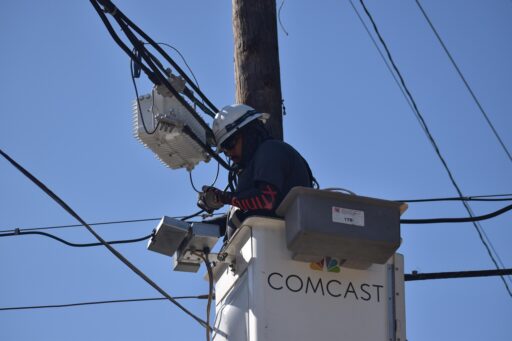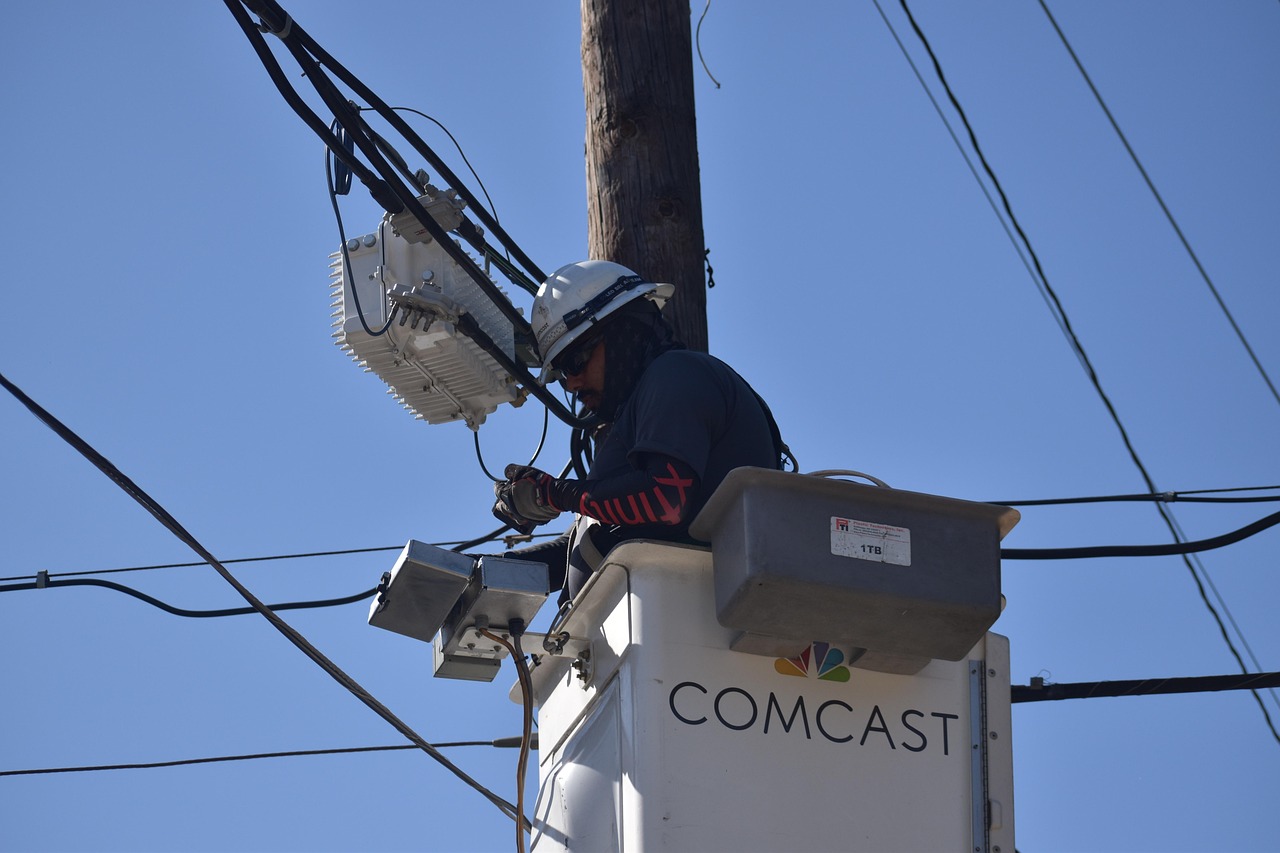- Environmental Initiatives and Impact
- Social Responsibility and Governance
- Challenges and Future Goals
- Key Sustainability Innovations and Technologies in Energy Efficiency
- Measurable Impacts: CO2 Emission Reductions and Energy Efficiency
- Challenges and Areas for Improvement
- Future Plans and Long-Term Goals
- Comparisons to Industry Competitors
- Our Thoughts
Comcast, a global telecommunications and media company, has made significant progress in its sustainability journey, focusing on environmental responsibility, social impact, and strong governance. The company has committed to reducing greenhouse gas emissions, increasing energy efficiency, and investing in sustainability-focused initiatives such as green infrastructure and circular economy programs. Through its Environmental, Social, and Governance (ESG) strategy, Comcast aims to integrate sustainability into its core operations while addressing climate-related risks and opportunities. This article provides an in-depth analysis of Comcast’s key sustainability initiatives, measurable impacts, challenges, and future goals.
Environmental Initiatives and Impact
Comcast has taken substantial steps to reduce its environmental footprint. The company has successfully decreased its Scope 1 and 2 greenhouse gas emissions by over 30% since 2019, demonstrating its commitment to carbon reduction. This progress aligns with its long-term sustainability targets, ensuring operational efficiencies and a reduced environmental impact. Comcast also aims to double its network energy efficiency by 2030, a goal that highlights its focus on energy conservation and infrastructure optimization.
Furthermore, Comcast has fully allocated a $1 billion Green Bond to fund various sustainability projects, including investments in green buildings, clean transportation, renewable energy, and circular economy initiatives. This financial commitment underscores its dedication to integrating sustainability into business operations.
Sources: (Comcast Impact, Comcast Sustainability, ESG News)
Social Responsibility and Governance
Comcast is also dedicated to social impact and governance through its various diversity, equity, and inclusion (DEI) programs. The 2023 Impact Report highlights Comcast’s commitment to digital equity and workforce diversity, ensuring that technology and internet access are available to underserved communities. These initiatives support education, workforce development, and economic opportunities for diverse populations.
In terms of governance, Comcast maintains a strong ESG risk rating from Sustainalytics, reflecting its proactive management of industry-specific ESG risks. This ensures that Comcast upholds high ethical standards, transparency, and corporate responsibility in its business operations.
Sources: (Comcast Impact Report, Sustainalytics ESG Rating)
Challenges and Future Goals
Despite notable progress, Comcast faces several sustainability challenges:
- Maintaining greenhouse gas reductions while expanding operations and increasing data transmission demands.
- Adapting to evolving environmental regulations, particularly related to energy consumption and emissions reporting.
- Enhancing waste management and circular economy initiatives, especially concerning e-waste and electronic device recycling.
In response, Comcast could integrate AI-driven supply chain optimizations to improve resource management and reduce energy consumption. Strengthening supplier engagement to ensure sustainability across the value chain will also be essential for long-term impact.
Key Sustainability Innovations and Technologies in Energy Efficiency
Comcast has made significant investments in sustainable technology to drive energy efficiency. Key initiatives include:
- Doubling Network Energy Efficiency by 2030: Comcast is implementing advanced network equipment, smart grid technology, and energy-efficient data centers to reduce energy waste and carbon emissions.
- Investments in Renewable Energy: The $1 billion Green Bond has supported the transition to clean energy solutions, further reducing Comcast’s reliance on fossil fuels.
- AI and Data-Driven Optimization: Comcast has explored AI-based network management systems to improve operational efficiency and minimize unnecessary energy consumption.
Sources: (Comcast Sustainability, ESG News)
Measurable Impacts: CO2 Emission Reductions and Energy Efficiency
Comcast’s sustainability programs have resulted in quantifiable environmental benefits, including:
- 30%+ reduction in Scope 1 and 2 greenhouse gas emissions since 2019, demonstrating significant progress in lowering its carbon footprint.
- Substantial investments in energy efficiency, with the goal of doubling network energy efficiency by 2030, reducing power consumption while maintaining high-performance connectivity.
- Expansion of renewable energy initiatives, with key investments in solar, wind, and other green energy sources.
These efforts align with global sustainability standards, positioning Comcast as a leader in corporate climate action.
Sources: (Comcast Impact)
Challenges and Areas for Improvement
While Comcast has made great strides, there are still areas for improvement:
- High energy demands of data centers and network operations continue to pose a sustainability challenge.
- Maintaining emissions reductions while scaling business operations requires further innovation in energy management and supply chain sustainability.
- Enhancing circular economy efforts, particularly in e-waste recycling and product lifecycle management, is a key opportunity for long-term sustainability.
To address these challenges, Comcast could:
- Invest further in AI-driven energy management systems to optimize power consumption.
- Expand supplier collaboration to ensure sustainability across the supply chain.
- Implement circular economy principles by enhancing e-waste recycling programs.
Future Plans and Long-Term Goals
Looking ahead, Comcast’s sustainability roadmap includes:
- Achieving 100% renewable energy usage, aligning with industry best practices.
- Expanding carbon reduction initiatives to further reduce emissions across operations.
- Strengthening DEI programs and digital equity initiatives to ensure technology access for all communities.
- Scaling AI and data-driven sustainability solutions to optimize operations and resource efficiency.
These goals position Comcast as a leader in corporate sustainability, driving innovation while addressing global climate challenges.
Sources: ( Comcast Sustainability Report)
Comparisons to Industry Competitors
When compared to other industry leaders such as AT&T and Verizon, Comcast’s sustainability efforts demonstrate strengths and areas for growth:
- Greenhouse Gas Reductions: Comcast’s 30% Scope 1 and 2 emissions reduction is on par with Verizon’s goal of carbon neutrality by 2035 and AT&T’s carbon neutrality commitment by 2035.
- Green Bond Investments: Comcast’s $1 billion Green Bond is comparable to Verizon’s issuance of green bonds for renewable energy and sustainability projects.
- Social Initiatives: Comcast’s digital equity programs align closely with AT&T’s investments in bridging the digital divide.
- Sustainability Governance: Comcast maintains strong ESG risk management ratings, ensuring accountability and compliance.
Sources: (Verizon Carbon Neutrality, AT&T Climate Commitments)
Our Thoughts
Comcast has made commendable progress in reducing greenhouse gas emissions, improving energy efficiency, and investing in green initiatives. The $1 billion Green Bond and 30%+ reduction in emissions showcase a strong commitment to sustainability. However, as operations expand, sustaining these environmental gains will require greater investment in AI-driven optimizations, circular economy initiatives, and supplier engagement.
Opportunities for further leadership in sustainability include:
- Enhancing AI-driven sustainability programs to improve energy efficiency and waste reduction.
- Scaling circular economy efforts, particularly in electronic waste recycling and sustainable product design.
- Strengthening partnerships with suppliers to create a more sustainable value chain.
By continuing to innovate and expand its sustainability commitments, Comcast can reinforce its position as an industry leader in environmental and social responsibility, setting a benchmark for the broader telecommunications and media sectors.






